
STEP UP AND BECOME A CITIZEN ARCHITECT
Why an FAIA became a City Council Member in the City of Laguna Hills
By Don Caskey, FAIA
I was in private sector followed by public sector practice for 45 years. I have been involved with AIA since I was a graduate student in 1971 at USC. There wasn’t even a Los Angeles Chapter of the AIA then. It was the Southern California Chapter.
I was the first student ‘voting’ member of the Board, and we met in the Bradbury Building in downtown LA. I guess you could call me an AIA junkie…an ‘Emeritus Junkie’ now. Fifty years of AIA, even though I didn’t become licensed and an official AIA regular member until 1976. I have held positions up and down boards at all component levels for those fifty years and participated in a lot of AIA firsts. In decades past, I was a member of the AIA CA Advocacy Committee reviewing legislation as it effected architecture and planning in California…sometimes tedious, but important to pay attention to.
But now, just when I thought I had retired, came a new first.
I was appointed to the City Council of the town I had lived in for the last forty years, the City of Laguna Hills. What possessed me to do that?! I had grandbabies to play with, traveling to do; in fact, my schedule was busier than ever…even busier than being a University Architect of a campus of the University of California!
The answer maybe lies in the fact that it is often difficult for architects to retire. In my case, the City of Laguna Hills was locked in a heated debate as to how and with what program we were going to redevelop the Laguna Hills Mall, a retail mall built on 68 acres in 1973 nearly 50 years ago. It was a longtime past its prime and an eyesore to the community yet sits in a prime place for redevelopment. The arguments leading to entitlements for the developer were vehement on both sides and nearly eight years in the making. The potential redevelopment was stuck in the mud…a losing proposition for the developer, the City, and its citizens.
A position on our City Council opened up for what was more than three years of a four year term. The pay was a whopping $600 stipend per month which works out to about $.28/hour. But, if you have lived in your town for four decades and raised your kids there, why not step up to a new role and be a “Citizen Architect”? This admonition goes double if you know how to break the gridlock and steer a project of that scale to a successful conclusion.
Long story short, that is what I did, and it has been both energizing and fulfilling. Architects are particularly well suited for roles like this. The subject matter of what we as architects can contribute on ranges from dealing with homelessness to development of sustainable residential communities, to revisioning your community for sustainable redevelopment and growth.
I wish now that I had stepped up to this kind of role in public service decades ago. One doesn’t literally need to volunteer to contribute through elected office. There are places where architects can meaningfully contribute on design review boards, planning commissions, parks and recreation, and traffic commissions. Architects bring a clear understanding of the breadth and depth of the ingredients and proper mix of elements of a livable community. They can educate members of their community when they have access to the appropriate platform.
Remember the maxim, “In the absence of information, people make things up!” Our communities struggle with too much of this. That is when communities get gridlocked and sustainable development gets embroiled in what we commonly reflect on as gutter politics.
I encourage all architects, especially AIA members, to get involved. Whether you are newly graduated or at the other end of the career spectrum, there is a leadership position for you in your community. The younger yous are, the sooner you can fine hone your communication skills which is immensely valuable in everything you will do later in your career.
In my case, I have been inserted into a management agreement with the developer to provide a collaborative watchful oversight of a $500M mixed use project that will be the largest investment within our City in its history…all positive in approach and hopefully outcome. We will soon be working on “Objective Design Standards” for our city. What is there not to like about that and visioning the development of your own community?
I have since been officially elected to fulfill the entire term. That is very fulfilling; even more than the $.28 per hour. The experience is worth much more than the dollar remuneration.
Don Caskey, FAIA was a founding Partner of Coleman/Caskey Architects, and a Senior Vice President of Carter Burgess later acquired by Jacobs Engineering. Don spent 5+ years as the Associate Vice Chancellor and University Architect at UC Riverside prior to retiring in 2013…but architects often don’t’ retire gracefully.

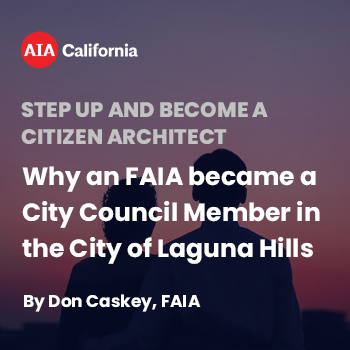
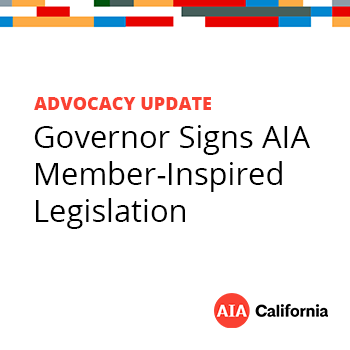
 Governor Newsom signed into law the AIA California-sponsored Senate Bill 1214 (
Governor Newsom signed into law the AIA California-sponsored Senate Bill 1214 (
 The Legislature finished considering and voting on bills on August 31st, completing its work in the 2021-22 Session. Among the hundreds of bills sent to the Governor for his consideration were several bills on which AIA CA holds a position. The Governor has until September 30th to decide the fate of these bills.
The Legislature finished considering and voting on bills on August 31st, completing its work in the 2021-22 Session. Among the hundreds of bills sent to the Governor for his consideration were several bills on which AIA CA holds a position. The Governor has until September 30th to decide the fate of these bills.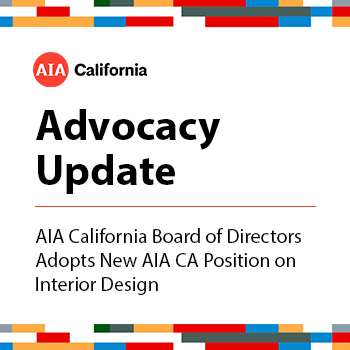
 The AIA CA Board of Directors, at its July meeting in Oakland, voted to change the AIA CA position on the creation of a Practice Act for Interior Design. The new position allows the current and any future AIA CA Board of Directors to establish a position on any legislation creating an ID Practice Act based upon the language in that legislation. The former AIA CA position was a categorical opposition to the creation of an ID Practice Act.
The AIA CA Board of Directors, at its July meeting in Oakland, voted to change the AIA CA position on the creation of a Practice Act for Interior Design. The new position allows the current and any future AIA CA Board of Directors to establish a position on any legislation creating an ID Practice Act based upon the language in that legislation. The former AIA CA position was a categorical opposition to the creation of an ID Practice Act.
 The AIA California Board of Directors regularly takes positions on legislation that impacts the profession, whether that impact is positive or negative.
The AIA California Board of Directors regularly takes positions on legislation that impacts the profession, whether that impact is positive or negative. 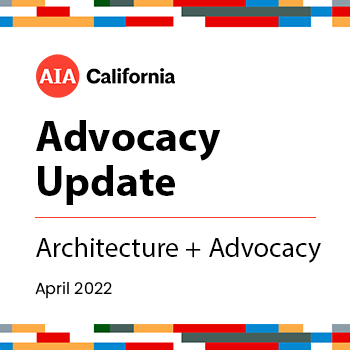
 I don’t think I’ve ever met an architect who did not value advocacy. As soon as one leaves the relative safety of academia and steps into the rough and tumble of the business and art of architecture, BOOM! The complexities, contradictions and obstacles that impact our ability to use the power of design to shape a better world become apparent. Sometime painfully so!
I don’t think I’ve ever met an architect who did not value advocacy. As soon as one leaves the relative safety of academia and steps into the rough and tumble of the business and art of architecture, BOOM! The complexities, contradictions and obstacles that impact our ability to use the power of design to shape a better world become apparent. Sometime painfully so!
 AIA California is sponsoring legislation this year to protect the intellectual property of architects when projects are under consideration by local planning departments. The legislation,
AIA California is sponsoring legislation this year to protect the intellectual property of architects when projects are under consideration by local planning departments. The legislation, 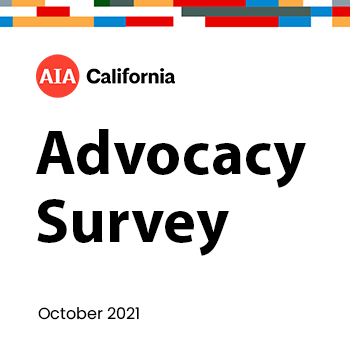
 It is that time of year again. Every year, in the Fall, AIA CA surveys the Members on how state law can be changed to improve the professional lives of architects. Think of it as a “there should be a law” survey. The results will be reviewed by Members who comprise our Advocacy Advisory Committee, who in turn will make recommendations to our Board of Directors.
It is that time of year again. Every year, in the Fall, AIA CA surveys the Members on how state law can be changed to improve the professional lives of architects. Think of it as a “there should be a law” survey. The results will be reviewed by Members who comprise our Advocacy Advisory Committee, who in turn will make recommendations to our Board of Directors.